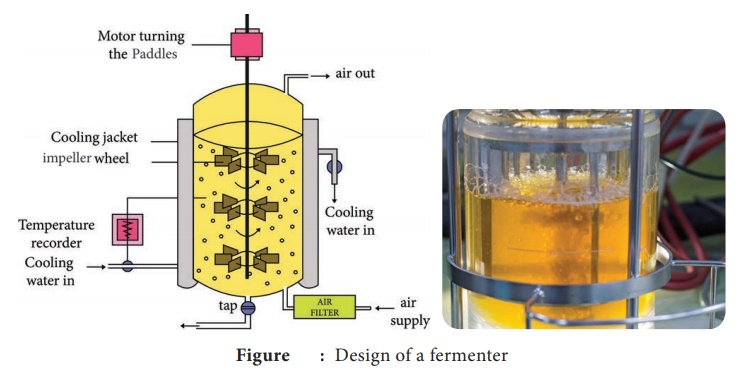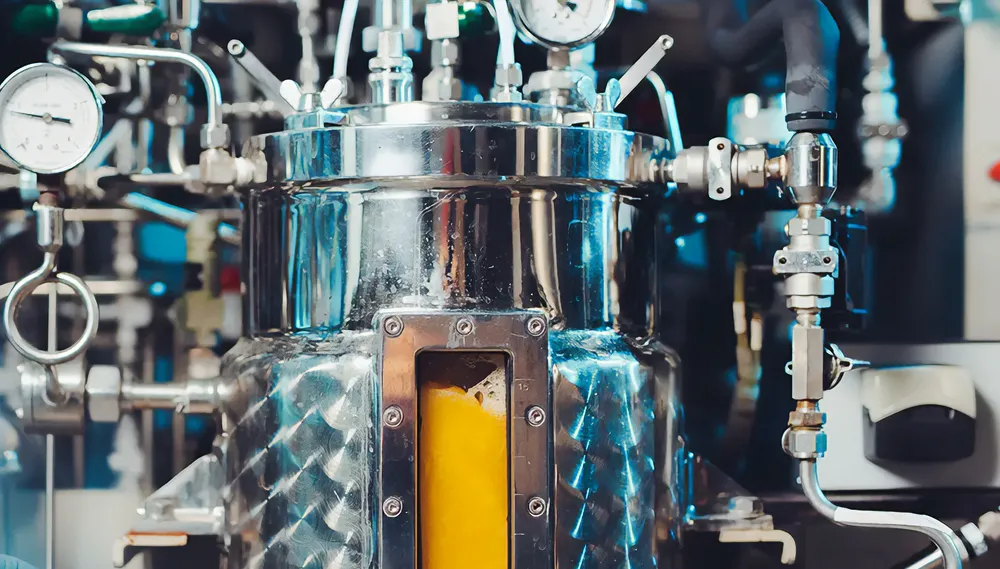Exploring Bioreactors & Fermentors: Powering Scientific Breakthroughs
.png)
In the expansive field of biotechnology and biomanufacturing, bioreactors and fermentors emerge as pivotal apparatuses, driving innovation and enabling the production of an array of valuable products. In this comprehensive guide, we embark on a journey through the fundamentals, methodologies, applications, and industry trends surrounding these indispensable tools, while showcasing how IT Tech's cutting-edge solutions can empower your scientific endeavors.
Bioreactors & Fermentors: Unveiling the Fundamentals
Bioreactors: The Workhorses of Biomanufacturing

Source: India Mart
At the heart of biomanufacturing processes lie bioreactors, serving as the cornerstone for the cultivation of various cell types. From producing proteins and vaccines to synthesizing pharmaceuticals, these vessels provide an optimized environment for cell growth, offering precise control over parameters such as temperature, pH, and nutrient availability.
Fermentors: Unleashing Microbial Power

Source: BrainKart
In contrast, fermentors specialize in microbial fermentation, harnessing the metabolic prowess of microorganisms to produce desired compounds. Whether it's enzymes, organic acids, or biofuels, fermentors are tailored to support the growth and metabolic activity of specific microorganisms, ensuring efficient production yields.
Key Differences and Similarities
While bioreactors and fermentors share similarities in their basic functionalities, such as the provision of optimal growth conditions, they diverge in their operational parameters and applications. While bioreactors are typically employed for mammalian cell culture and recombinant protein production, fermentors excel in microbial fermentation processes.
Delving into Methodologies & Techniques
Essential Considerations for Bioreactor Operation
Operating a bioreactor demands meticulous attention to various factors, including selecting the right design to suit your specific application. Factors such as agitation mechanism, gas sparging, and vessel geometry play pivotal roles in optimizing cell growth and productivity.
Choosing the Right Bioreactor Design

Source: Microbe Notes
From stirred-tank bioreactors to airlift reactors and perfusion systems, the choice of bioreactor design hinges on the specific requirements of your bioprocess. Factors such as oxygen transfer efficiency, shear stress, and scalability must be carefully considered when selecting the most suitable option.
Media Preparation and Sterilization
Maintaining a sterile environment within the bioreactor is paramount to prevent contamination and maintain cell viability. Proper media preparation, sterilization techniques, and aseptic handling practices are essential for successful bioprocess operations.
Cell Culture and Monitoring
Monitoring cell culture parameters, such as cell density, viability, and metabolic activity, allows for real-time optimization of bioprocess conditions. Advanced analytical techniques, including flow cytometry, metabolomics, and online sensors, enable precise control and monitoring of cell behavior.
Fermentation Techniques: From Simple to Sophisticated
Fermentation processes encompass a spectrum of techniques based on their operational mode and feeding strategy.
Batch Fermentation

Source: LAMBDA Instrument
Batch fermentation involves the inoculation of a culture into a fixed volume of medium, where cells grow until nutrients are depleted or waste products accumulate. While simple in design, batch fermentation lacks the ability to sustain prolonged production periods and requires frequent batch-to-batch processing.
Fed-Batch Fermentation

Source: Biology Reader
erFed-batch fermentation overcomes the limitations of batch fermentation by continuously supplying nutrients or substrates to the culture during the fermentation process. This allows for extended production times and higher product concentrations, making it suitable for high-density cell culture and protein expression.
Continuous Fermentation

Source: Researchgate
Continuous fermentation offers continuous product output by maintaining a steady-state operation, where fresh medium is continuously fed into the system while product is harvested simultaneously. This approach maximizes productivity and minimizes downtime, making it ideal for large-scale industrial production.
Exploring Diverse Applications
Bioreactors and fermentors are versatile tools with applications spanning various industries, driving advancements in pharmaceuticals, food and beverage production, biofuels, and environmental remediation.
Pharmaceuticals & Biotherapeutics
In the pharmaceutical industry, bioreactors are indispensable for the production of recombinant proteins, monoclonal antibodies, and viral vectors for gene therapy. These biologics hold promise for treating various diseases, including cancer, autoimmune disorders, and genetic disorders.
Food & Beverage Production
In the pharmaceutical industry, bioreactors are indispensable for the production of a wide range of biologics. These include recombinant proteins, monoclonal antibodies, and viral vectors used in gene therapy. Biologics hold immense promise for treating a plethora of diseases, including cancer, autoimmune disorders, and genetic disorders.
Recombinant Proteins
Bioreactors provide the ideal environment for the expression and purification of recombinant proteins. These proteins, often derived from genetically modified organisms, serve as crucial therapeutics for various medical conditions. Examples include insulin for diabetes management and growth factors for tissue regeneration.
Monoclonal Antibodies
Monoclonal antibodies, engineered to target specific antigens, have revolutionized the treatment of diseases such as cancer and autoimmune disorders. Bioreactors enable the large-scale production of monoclonal antibodies, ensuring consistent quality and purity for clinical use.
Biofuels & Renewable Energy
The quest for sustainable energy sources has led to extensive research into biofuels production using bioreactors and fermentors. Microbial fermentation of biomass-derived feedstocks offers a renewable alternative to fossil fuels, reducing greenhouse gas emissions and dependence on finite resources.
Biomass-Derived Feedstocks
Bioreactors are utilized to ferment biomass-derived feedstocks, such as sugars, lignocellulosic materials, and algae, into biofuels such as ethanol, biodiesel, and biogas. These renewable fuels can be used to power vehicles, generate electricity, and heat buildings, reducing carbon emissions and mitigating climate change.
Algal Biofuels
Algae are promising feedstocks for biofuel production due to their high lipid content and rapid growth rates. Bioreactors enable the cultivation of algae under controlled conditions, optimizing biomass production and lipid accumulation for the efficient extraction of biofuels.
Environmental Remediation & Waste Treatment
Bioremediation harnesses microbial processes in bioreactors to degrade pollutants and remediate contaminated environments. From wastewater treatment to soil remediation, bioreactors offer eco-friendly solutions for mitigating environmental pollution and preserving natural ecosystems.
Wastewater Treatment
Bioreactors play a crucial role in wastewater treatment by facilitating the degradation of organic pollutants through microbial metabolism. These bioprocesses help purify wastewater before it is discharged into the environment, reducing the ecological impact of human activities on water bodies.
Soil Remediation
Bioreactors are used in soil remediation projects to degrade contaminants such as petroleum hydrocarbons, heavy metals, and pesticides. Microorganisms capable of metabolizing these pollutants are cultivated in bioreactors, accelerating the remediation process and restoring soil health.
Biogas Production from Organic Waste
Anaerobic bioreactors are employed to convert organic waste, such as agricultural residues, food scraps, and sewage sludge, into biogas through microbial fermentation. This renewable energy source can be used for heating, electricity generation, and vehicle fuel, reducing reliance on fossil fuels and landfilling of organic waste.
Industry Trends & Future Outlook
The landscape of bioreactors and fermentors is continually evolving, driven by advancements in bioprocess engineering, automation, and biotechnology.
Advancements in Bioreactor Design & Automation
Innovations in bioreactor design, including miniaturization, single-use technologies, and integrated process control systems, are enhancing productivity, flexibility, and scalability. Automated bioprocess platforms enable real-time monitoring, optimization, and data-driven decision-making, revolutionizing biomanufacturing workflows.
Single-Use Technologies Gaining Traction
Single-use bioreactor systems offer cost-effective and flexible solutions for biopharmaceutical manufacturing, eliminating the need for complex cleaning and validation processes associated with traditional stainless-steel bioreactors. These disposable systems reduce the risk of cross-contamination and enable rapid process turnaround, accelerating time-to-market for biologics.
Personalized Medicine & Bioprinting Drive Innovation
The rise of personalized medicine and tissue engineering is fueling demand for advanced bioreactor systems capable of culturing patient-specific cells and tissues. Bioprinting technologies, combined with bioreactor perfusion systems, enable the fabrication of functional tissues and organs for regenerative medicine applications, heralding a new era of personalized healthcare.
Equipping Your Lab for Success: IT Tech's Solutions
At IT Tech, we offer a comprehensive portfolio of bioreactors, fermentors, and laboratory consumables tailored to meet your research and production needs.
Comprehensive Bioreactor & Fermentor Portfolio
From benchtop systems for academic research to large-scale bioprocess platforms for industrial manufacturing, our bioreactor and fermentor solutions cater to diverse applications and scale-up requirements.
Expert Consultation & Technical Support
Our team of experienced scientists and engineers is dedicated to providing expert consultation, training, and technical support to help you optimize your bioprocess workflows and achieve reliable, reproducible results.
High-Quality Lab Consumables for Optimal Results
In addition to bioreactors and fermentors, we offer a wide range of high-quality lab consumables, including cell culture media, growth factors, and disposable bioprocess bags, ensuring consistent performance and ease of use in your biomanufacturing operations.
Conclusion: Cultivating Growth with IT Tech
As biotechnology continues to drive scientific breakthroughs and transform industries, the importance of robust bioreactor and fermentor technologies cannot be overstated. By partnering with IT Tech, you gain access to cutting-edge solutions, expert support, and a trusted partner committed to empowering your research and production endeavors. Contact us today to learn more about our offerings and discover how we can help you unlock the full potential of bioreactors and fermentors for your applications.
Products You may Like
Check out other IT- Tech product that suit your taste
Subscribe to our newsletter
Stay updated with IT-Tech Insights
Related posts
Check out other IT- Tech Scientific Resources
.png)
Integrating Bioreactors & Fermentors for Lab Efficiency
Discover expert tips and best practices for seamlessly integrating bioreactors and fermentors into your laboratory workflow. From selecting the right equipment to optimizing growth conditions, elevate your scientific endeavors with our comprehensive guide.

Transforming Scientific Discovery with Bioreactors and Fermentors
Explore the transformative potential of bioreactors and fermentors in driving cutting-edge research across biotechnology, pharmaceuticals, and more. Discover the latest advancements shaping the future of scientific innovation.
.png)
Making the Right Investment: A Detailed Analysis of Bioreactors
Discover the definitive guide to making informed investments in bioreactors. Explore the technical nuances, economic considerations, and supplier partnerships crucial for maximizing returns in bioprocessing. From single-use to stainless steel, gain insights to navigate the complexities and optimize your lab or production facility with expert advice and tailored solutions.










































































